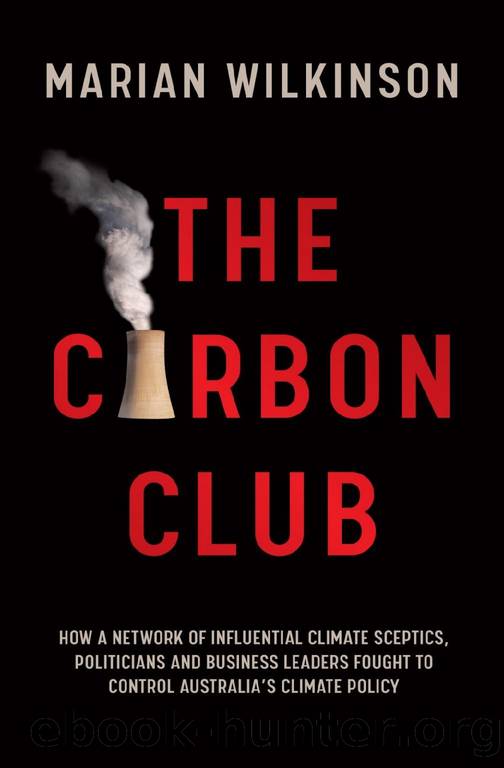The Carbon Club : How a Network of Influential Climate Sceptics, Politicians and Business Leaders Fought to Control Australia's Climate Policy (2020) by Wilkinson Marian

Author:Wilkinson, Marian [Wilkinson, Marian]
Language: eng
Format: epub
Published: 0101-01-01T00:00:00+00:00
In the lead-up to the G20 summit in Brisbane, some of the coal giants had been keen to capitalise on Australiaâs support. One in particular, Americaâs Peabody Energy, was closely in tune with the governmentâs thinking. Earlier that year, Peabodyâs chief executive, Greg Boyce, had launched a worldwide public-relations campaign pushing back against renewable energy and promoting coal-fired power plants. The companyâs big message was that energy poverty, not climate change, was âthe worldâs number one human and environmental crisisâ.
Peabodyâs âAdvanced Energy for Lifeâ campaign was designed in part by the global lobbying firm Burson-Marsteller. It pushed the alarming statistic that 3.5 billion people in the world were âwithout adequate access to energyâ. Images of desperate children and babies pressed the case that coal could end âenergy povertyâ using todayâs âadvanced clean coal technologiesâ. The problem was, of course, no technology was actually delivering commercial clean coal at this point but a small footnote in the glossy brochures had a very broad definition of clean coal that included plants that were simply more efficient. Coal power could replace highly polluting wood stoves, but even the most efficient new coal plants would still produce a lot more greenhouse gas emissions than renewables.
Despite this, by the time of the G20 meeting in Brisbane, Peabody was claiming 500,000 people around the world had joined its social media campaign to lobby world leaders to end âenergy povertyâ. At the end of the G20, Abbott was echoing Peabodyâs messaging.
Peabodyâs line on energy poverty wasnât new. It had pushed it since 2011. But Advanced Energy for Life rebooted the message at a time when the company needed to keep coal on top in the energy mix. Prices had slumped and climate change was posing an existential threat to coalâs long-term future. Peabody was also under big financial pressure. In the past, the company had aggressively attacked climate science and funded climate-sceptic groups, but this was becoming less and less effective. The campaign to end energy poverty was a far easier sell for its political allies. Peabodyâs critics believed it was designed in part to fight Obamaâs new regulations in the US restricting carbon dioxide emissions from coal-fired power stations. But it was also pitched at the Indian and Asian markets, where coal imports were rising.
Peabody was a big coalminer in Australia with a board seat on the peak mining lobby, the Minerals Council of Australia, alongside BHP, Rio Tinto and Glencore. It had been part of the campaign against Gillardâs emissions trading scheme run by the old coal lobby, the Australian Coal Association. That lobby had now been absorbed into the Minerals Council. The councilâs new chief executive, Brendan Pearson, had just finished a two-year stint at Peabodyâs Australian arm.
Peabodyâs energy poverty message in Australia was a bit disingenuous. While Australiaâs thermal coal exports were powering electricity plants in Asia, its lucrative coking coal exports, largely from Queensland, were fuelling steelmaking in Japan, China, Korea and Taiwan, not exactly lifting the world out of grinding poverty.
But Abbott embraced the cause of âenergy povertyâ with a passion, and so did his key ministers.
Download
This site does not store any files on its server. We only index and link to content provided by other sites. Please contact the content providers to delete copyright contents if any and email us, we'll remove relevant links or contents immediately.
| Anthropology | Archaeology |
| Philosophy | Politics & Government |
| Social Sciences | Sociology |
| Women's Studies |
The Secret History by Donna Tartt(19066)
The Social Justice Warrior Handbook by Lisa De Pasquale(12189)
Thirteen Reasons Why by Jay Asher(8897)
This Is How You Lose Her by Junot Diaz(6881)
Weapons of Math Destruction by Cathy O'Neil(6269)
Zero to One by Peter Thiel(5792)
Beartown by Fredrik Backman(5742)
The Myth of the Strong Leader by Archie Brown(5504)
The Fire Next Time by James Baldwin(5434)
How Democracies Die by Steven Levitsky & Daniel Ziblatt(5217)
Promise Me, Dad by Joe Biden(5148)
Stone's Rules by Roger Stone(5084)
A Higher Loyalty: Truth, Lies, and Leadership by James Comey(4955)
100 Deadly Skills by Clint Emerson(4922)
Rise and Kill First by Ronen Bergman(4784)
Secrecy World by Jake Bernstein(4746)
The David Icke Guide to the Global Conspiracy (and how to end it) by David Icke(4711)
The Farm by Tom Rob Smith(4504)
The Doomsday Machine by Daniel Ellsberg(4487)
